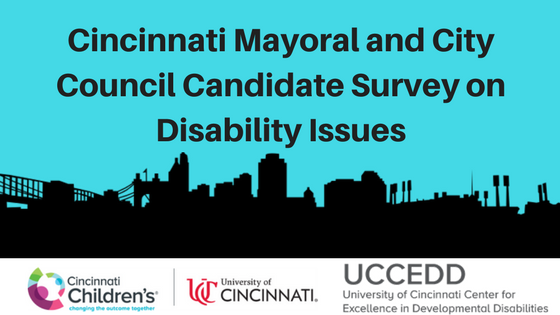The University of Cincinnati Center for Excellence in Developmental Disabilities (UCCEDD) recently surveyed both Cincinnati Mayoral Candidates and 24 Cincinnati City Council Candidates on issues of importance for Cincinnatians with disabilities. One mayoral candidate (Mayor Cranley) and 16 City Council Candidates responded to the survey on Disability Issues, resulting in an overall response rate of 68%.
The Candidates’ Questionnaire on Disability Issues included 7 questions that addressed topics ranging from the accessibility of the City’s recreation centers to housing and employment. Topics were determined through dialogue with Cincinnati residents with disabilities, their family members, and professionals who work in the field of disability policy. While Census[1] rates vary slightly, between 12% and 17% of the City’s population is estimated to have a disability. Nationally, approximately 1 in 5 people have a disability.
While disability-related issues impact a large sector of a population, they are often misunderstood and under-recognized. Various community and media-led groups hosted forums and invited candidate to reflect on a wide range of issues and positions during this busy campaign. No other group exerted a focused effort to explore disability topics. Many of the strategies and solutions proposed by candidates who responded could result in positive outcomes for all Cincinnatians-not just those with disabilities.
Recreation and Accessibility
There are currently 12 out of the 23 Cincinnati Recreation Centers that are physically accessible to people with disabilities. UCCEDD asked whether candidates would support a strategic effort to make all Centers accessible. All 17 respondents (Mayor Cranley and 16 Cincinnati Council Candidates) responded that YES they would support these efforts. Recreation, including programming provided by the Cincinnati Recreation Commission, was definitely of interest to many candidates as several individual responses included mention of these programs related to people with disabilities.
Hiring Goals for People with Disabilities
The City of Cincinnati has committed to a number of initiatives to increase hiring and contract awards to minority and women-owned businesses. The City does not, however, have a hiring goal for people with disabilities. UCCEDD asked candidates whether they would support an aspirational hiring goal of 7% for people with disabilities. This goal is a current standard set for cities that have federal contracts. All 16 responding City Council Candidates responded that YES they would support a 7% aspirational hiring goal. Candidate Pastor added to his affirmative response that Cincinnati should seek to hire more people with disabilities because it was the right thing to do not related to federal funding. Candidate and Councilwoman Murrary added the example that her campaign staff has included people with disabilities. Mayor Cranley responded NO. He would not support the expansion of the City’s hiring goals. He did not expand upon this response.
Accessible and Affordable Housing
A 2014 Analysis of Impediments to Fair Housing Report published by the City of Cincinnati[2] recognized a significant need to increase accessible and visitable housing opportunities. Mayor Cranley noted his collaborations with Vice Mayor Mann and Council Members Flynn and Sittenfeld to incentivize visitability in new developments. Several other candidates mentioned visitability as a priority. Most City Council candidates responded with an emphasis on affordable housing. While important, affordable but inaccessible housing often isn’t an option for Cincinnatians with disabilities. Candidate Michelle Dillingham pointed out a problem that many people with disabilities do not have the funds necessary to modify their homes. She cited People Working Cooperatively as a model community resource for this challenge. Candidate and Councilman Seelbach responded with a need to better follow standards set by the Americans with Disabilities Act and consider the benefit of modifying homes so that more people can age in place.
Accessible Transportation
Transportation is a major barrier to employment, housing, recreation, and community integration for many people with disabilities. Mayor Cranley responded with his history of advocacy fighting a proposed massive increase to Access fares and support for a countywide sales tax levy to better fund the City’s overall transportation system. Vice Mayor Mann echoed this need with an added goal to expand service connections and improve accessibility. Candidate Bauman noted his leadership experience within several transportation groups or taskforces. Within this work, he’s written a resolution that declares public transportation a civil right. Candidate and Councilman Sittenfeld expressed a need to fix ACCESS, indicating an awareness of its many problems. Candidate Dennard would support a fleet of wheelchair taxis but unless and until current Ohio HB 195 is passed, such vehicles would have to be licensed as medical transport ambulettes. This barrier has precluded wheelchair taxi businesses from coming to Ohio.
Inclusion
The phrase, “Nothing about us without us,” is often cited as a mantra within circles of disability advocacy. Many candidates seem to align with this belief as the majority of respondents repeated a need and suggested several strategies to invite, listen to, and incorporate the perspectives and ideas of Cincinnatians with disabilities into decision-making for the future of Cincinnati. Mayor Cranley highlighted his appointment of the City’s first Chief Advocacy Officer for Aging and Accessibility and ongoing collaboration with the Cincinnati Accessibility Board of Advisors (CABA). Several candidates noted their awareness of CABA and an expressed interest to initiate or continue work with the group.
The City of Cincinnati has undoubtedly made significant progress towards becoming a more inclusive city that celebrates all forms of its diversity. WalletHub recently named Cincinnati 18th in the nation for Best Cities for People with Disabilities. Our City leaders have and will hold the potential to continue this momentum of progress. We appreciate their time to complete this survey that allowed us and others the opportunity to learn more about their views on disability.
Full responses from All candidates. City Council candidates are listed in alphabetical order.
[1] The United States Census Bureau 2011-2015 Quick Facts: https://www.census.gov/quickfacts/fact/table/cincinnaticityohio/PST045216
[2] City of Cincinnati and Hamilton County (2014). Analysis of Impediments to Fair Housing: http://www.cincinnati-oh.gov/community-development/consolidated-plan/analysis-of-impedimens-to-fair-housing-pdf/

